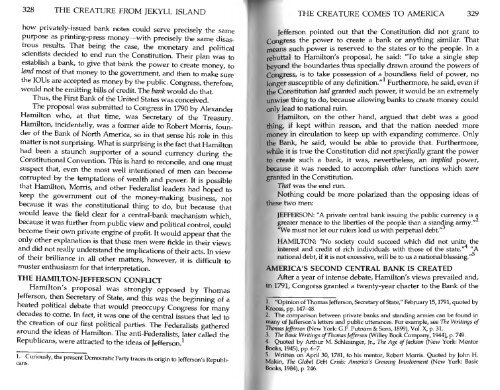Create successful ePaper yourself
Turn your PDF publications into a flip-book with our unique Google optimized e-Paper software.
328 THE CREATURE FROM JEKYLL ISLAND<br />
how privately-issued bank notes could serve precisely the same<br />
purpose as printing-press money—with precisely the same disastrous<br />
results. That being the case, the monetary and political<br />
scientists decided to end run the Constitution. Their plan was to<br />
establish a bank, to give that bank the power to create money, to<br />
lend most of that money to the government, and then to make sure<br />
the IOUs are accepted as money by the public. Congress, therefore,<br />
would not be emitting bills of credit. The bank would do that.<br />
Thus, the First Bank of the United States was conceived.<br />
The proposal was submitted to Congress in 1790 by Alexander<br />
Hamilton who, at that time, was Secretary of the Treasury.<br />
Hamilton, incidentally, was a former aide to Robert Morris, founder<br />
of the Bank of North America, so in that sense his role in this<br />
matter is not surprising. What is surprising is the fact that Hamilton<br />
had been a staunch supporter of a sound currency during the<br />
Constitutional Convention. This is hard to reconcile, and one must<br />
suspect that, even the most well intentioned of men can become<br />
corrupted by the temptations of wealth and power. It is possible<br />
that Hamilton, Morris, and other Federalist leaders had hoped to<br />
keep the government out of the money-making business, not<br />
because it was the constitutional thing to do, but because that<br />
would leave the field clear for a central-bank mechanism which,<br />
because it was further from public view and political control, could<br />
become their own private engine of profit. It would appear that the<br />
only other explanation is that these men were fickle in their views<br />
and did not really understand the implications of their acts. In view<br />
of their brilliance in all other matters, however, it is difficult to<br />
muster enthusiasm for that interpretation.<br />
THE HAMILTON-JEFFERSON CONFLICT<br />
Hamilton's proposal was strongly opposed by Thomas<br />
Jefferson, then Secretary of State, and this was the beginning of a<br />
heated political debate that would preoccupy Congress for many<br />
decades to come. In fact, it was one of the central issues that led to<br />
the creation of our first political parties. The Federalists gathered<br />
around the ideas of Hamilton. The anti-Federalists, later called the<br />
Republicans, were attracted to the ideas of Jefferson. 1<br />
1. Curiously, the present Democratic Party traces its origin to Jefferson's Republi-<br />
THE CREATURE COMES TO AMERICA 329<br />
Jefferson pointed out that the Constitution did not grant to<br />
Congress the power to create a bank or anything similar. That<br />
means such power is reserved to the states or to the people. In a<br />
rebuttal to Hamilton's proposal, he said: "To take a single step<br />
beyond the boundaries thus specially drawn around the powers of<br />
Congress, is to take possession of a boundless field of power, no<br />
Furthermore, he said, even if<br />
longer susceptible of any definition."<br />
the Constitution had granted such power, it would be an extremely<br />
unwise thing to do, because allowing banks to create money could<br />
only lead to national ruin.<br />
Hamilton, on the other hand, argued that debt was a good<br />
thing, if kept within reason, and that the nation needed more<br />
money in circulation to keep up with expanding commerce. Only<br />
the Bank, he said, would be able to provide that. Furthermore,<br />
while it is true the Constitution did not specifically grant the power<br />
to create such a bank, it was, nevertheless, an implied power,<br />
because it was needed to accomplish other functions which were<br />
granted in the Constitution.<br />
That was the end run.<br />
Nothing could be more polarized than the opposing ideas of<br />
these two men:<br />
JEFFERSON: "A private central bank issuing the public currency is a<br />
greater menace to the liberties of the people than a standing army."<br />
"We must not let our rulers load us with perpetual debt"<br />
HAMILTON: "No society could succeed which did not unite the<br />
interest and credit of rich individuals with those of the state." "A<br />
national debt, if it is not excessive, will be to us a national blessing."<br />
AMERICA'S SECOND CENTRAL BANK IS CREATED<br />
After a year of intense debate, Hamilton's views prevailed and,<br />
in 1791, Congress granted a twenty-year charter to the Bank of the<br />
:<br />
I- "Opinion of Thomas Jefferson, Secretary of State/' February 15, 1791, quoted by<br />
Krooss, pp. 147-48.<br />
2. The comparison between private banks and standing armies can be found in<br />
many of Jefferson's letters and public utterances. For example, see The Writings of<br />
Thomas Jefferson (New York: G.P. Putnam & Sons, 1899), Vol. X, p. 31.<br />
©. The Basic Writings of Thomas Jefferson (Willey Book Company, 1944), p. 749.<br />
|k Quoted by Arthur M. Schlesinger, Jr., The Age of Jackson (New York: Mentor<br />
Books, 1945), pp. 6-7.<br />
5. Written on April 30, 1781, to his mentor, Robert Morris. Quoted by John H.<br />
Makin, The Global Debt Crisis: America's Growing Involvement (New York: Basic<br />
Books, 1984), p. 246.


